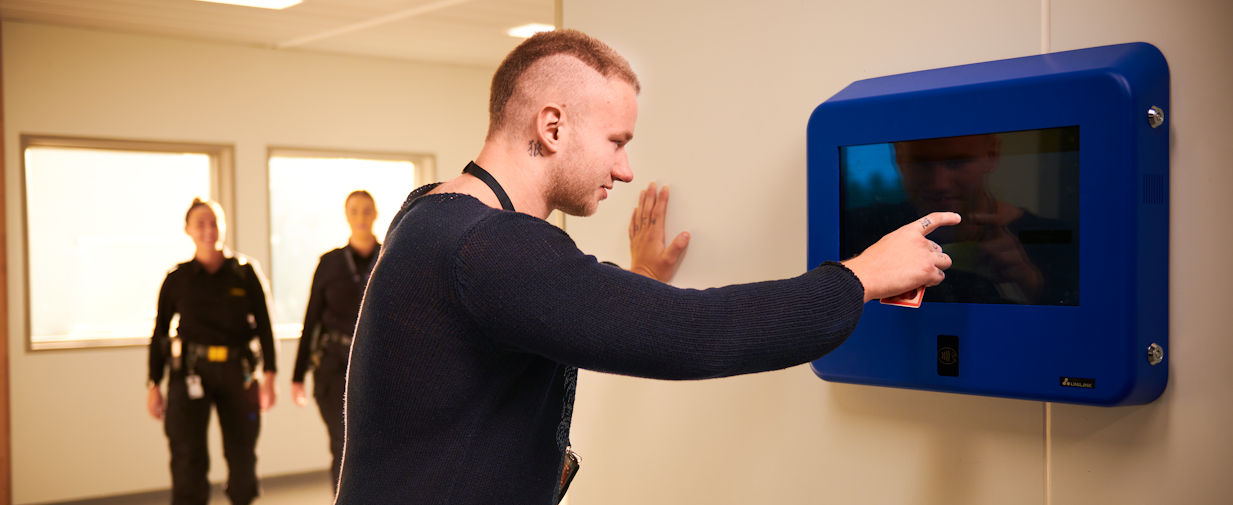Change your business address
If you're a full access user, you can update your business, registered, mailing and personal addresses within Online for Business and the Business banking app.
Read how Unilink are redefining justice systems through cutting-edge AI.
Read time: 3 mins Added date: 02/11/2023

Photo source: Unilink. A resident in the new Agder prison uses Unilink’s technology. Norwegian Correctional Service – Kriminalomsorgen has selected Unilink, an award-winning UK company, as a provider of offender management solution (OMS).
The software company Unilink is creating a more efficient future for the justice system. Through advancements in AI and with support from Lloyds Bank, the company is transforming prisoner rehabilitation and helping to prevent recidivism.
Francis Toye, founder of Unilink, began his career selling mainframe computers in IBM's enterprise division. When IBM began downsizing its local government business unit, Francis negotiated a settlement and used the funds to start out on his own. Unilink was born in 1994. He retained the opportunity to sell to the London boroughs he had served while at IBM, which helped kickstart his venture with large local authorities.
Later, as the internet emerged, Francis saw a need to transition away from hardware-oriented products.
“Our commitment to innovation helped us evolve from hardware to software,” he says. “We found success in unexpected places which ultimately laid the foundation for the company's current endeavours.”
One of these foundational pillars was when Francis secured a contract with UKDS, UK Detention Services, to help manage immigration detainees. By incorporating biometrics, Unilink’s software could now enhance the tracking, identification and management of detainees within immigration centres. It was a significant success and was soon extended to help manage prisons.
Since then, Unilink has made significant strides in revolutionising the way technology is used to empower prisoners. Today its prisoner self-service product carries out over 300 million prisoner transactions every year helping prisoners to take more responsibility for their own lives, reducing prison officers’ workload and making prisons safer.
Francis recalls that entering the justice and immigration centre sector was challenging due to lingering scepticism around new technology providers. Yet: “our reputation for effective software solutions allowed us over a few years to capture 100% of the private sector market,” he says.
Francis Toye Founder, UnilinkOur commitment to innovation helped us evolve from hardware to software. We found success in unexpected places.
A paper published in The Palgrave Handbook of International Cybercrime and Cyberdeviance supports the positive impact digital technology firms like Unilink are having on reducing reoffending rates. In part, says Francis, “this paper led to the Ministry of Justice adopting our prisoner self-service system.”
Building on this foundation Unilink has initiated closer collaborations with prison partners to tackle social problems within prisons. In cooperation with Serco, the business has developed a highly innovative application called Alert, Intervene & Monitor (AIM), a tool that analyses patterns of behaviour. Through extensive user research and analysis of prisoner transactional data, Unilink has integrated additional risk factors into the application for suicide and self-harm.
Over the years, Unilink has grown steadily from around 30 employees in 2001 to approximately 220 today. With ambitions to continue the momentum, Francis reached out to Lloyds Bank this year after noting the bank’s commitment to providing secure online banking services, multi-currency support, and its alignment with Unilink's growth ambitions.
Ben Maynard, Relationship Manager at Lloyds Bank, says: “Our conversations with Francis and the team have been around exploring options such as term finance, revolving credit facilities, or capital access methods that would enable Unilink to make gradual investments over a three to four-year period.”
Lloyds Bank’s Growth and Structured Finance (GSF) team – a new team established to deliver forward-looking, cashflow financing – was on hand to support Francis’ decision making. The GSF team builds on Lloyds Bank’s longstanding commitment to deliver relationship-led, through-the-cycle funding to SMEs as part of our ongoing support for British businesses.
Ben continues: “GSF’s approach aligns with Unilink's intention to strategically implement AI technologies and utilise the data the prison service has available.”
Beyond creating a better operating and more rehabilitative justice environment, Unilink became officially certified as carbon neutral this year. And going into 2024, the business will redouble their efforts by “looking into ways of advancing our environmental sustainability in operations by investing in energy conservation measures and following certification standards,” Francis says.
Lloyds Bank’s global footprint will be a valuable point of difference, adds Francis, as Unilink looks to grow within the UK and internationally. The business already has a presence in Belgium and Norway where they are engaged in substantial Offender Management software projects. And they are actively bidding for more international contracts with each project ranging from £10 to £20 million.
Unilink's journey has been one of continuous expansion and innovation. By leveraging technology Unilink is helping bridge gaps, enhance communication, and empower people in prison and on probation to successfully reintegrate into society while reducing the likelihood of re-offending. As Francis and his growth team widen the net, the business will need key partners.
“We are willing to support Unilink's initiatives, whether they involve AI investments or potential acquisitions,” says Ben Maynard. “The importance of these investments is highlighted, not only from a business perspective but also in terms of their social impact, such as preventing suicides in prisons and improving the probation journey.”
Get in touch with your Relationship Manager to find out how Lloyds Bank can help with your business investments.